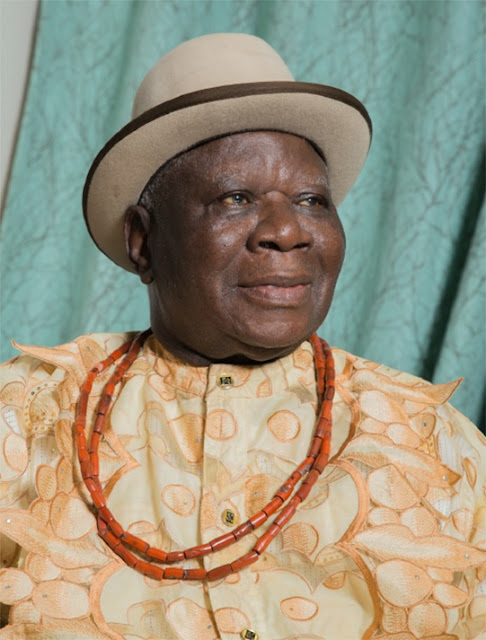The leader of the Pan Niger Delta Forum (PANDEF), Chief Edwin Kiagbodo Clark, has passed away at the age of 97. His death was confirmed on Tuesday in a statement released by his family. The statement, issued by Professor C.C. Clark, a representative of the family, reads: “The Clark-Fuludu Bekederemo family of Kiagbodo Town, Delta State, wishes to announce the passing of Chief (Dr.) Sen. Edwin Kiagbodo Clark OFR, CON on Monday, 17th February 2025. The family appreciates your prayers at this time. Other details will be announced later by the family.”
This news has left the country in mourning, especially the Niger Delta region, where Clark was a towering figure and a voice for the people. His death comes just a few days after the passing of Pa Ayo Adebanjo, the leader of the Afenifere group, who also passed away at 96. Both Clark and Adebanjo were key figures in the political landscape of Nigeria, known for their tireless efforts in shaping the political future of the country.
Edwin Clark’s death marks the end of a remarkable life that spanned almost a century. Born on May 25, 1927, in Kiagbodo Town in Delta State, Clark was a well-respected politician, lawyer, and nationalist. He was deeply committed to the cause of his people in the Niger Delta region and dedicated much of his life to advocating for their rights, particularly in relation to resource control, development, and justice.
Clark’s political career began in the 1960s when he first became involved in regional politics. He served as Commissioner for Education in the Mid-Western Region between 1968 and 1971. Later, between 1972 and 1975, he was appointed Commissioner for Finance and Establishment in the defunct Bendel State. But it was at the national level that Clark truly made his mark.
He was appointed Commissioner for Information in 1975 by the then military government of General Murtala Mohammed. During this time, he played a pivotal role in disseminating government policies and decisions to the public, becoming a trusted figure in the nation’s political scene. In 1979, Clark was elected as a Senator, representing the Niger Delta region until 1983.
Clark’s contributions to Nigerian politics went beyond holding political office. He was known for his strong advocacy for regional autonomy and greater recognition for the Niger Delta people, who often felt sidelined in national matters. As the leader of PANDEF, Clark worked tirelessly to promote the welfare of the Niger Delta, seeking fairer treatment for its people and greater development of the region’s resources.
Throughout his career, Clark was not just a politician but also a peacemaker. In a country as diverse as Nigeria, ethnic and political differences often led to tension, especially in the Niger Delta. Clark was known for his efforts to bring together warring communities and politicians, mediating disputes to restore peace and harmony.
In one of his recent efforts, Clark set up a reconciliation committee aimed at mending the political rift between Governor Siminalayi Fubara and his former political godfather, Nyesom Wike. This move was seen as a step towards healing divisions in the political landscape of Rivers State, and it reflected Clark’s commitment to resolving conflicts for the greater good.
The committee, which was headed by Obong Victor Attah, a former governor of Akwa Ibom State, was formed during a special General Assembly of PANDEF in Port Harcourt in October 2024. In the statement issued at the end of the assembly, Clark’s leadership in bringing together people from different political backgrounds was praised, highlighting his enduring influence in the region.
Clark’s contributions were not limited to the practical aspects of politics. He was also known for his intellectual contributions to national and regional discourse. His involvement in discussions about Nigeria’s future continued until his death. In 2022, Clark, along with Pa Ayo Adebanjo, attended the Greater Nigeria Conference (GNC) in Abuja, where leaders from different parts of the country gathered to discuss the possibility of a southeastern Nigerian president emerging in the 2023 general elections.
The GNC, organized by the global Igbo think tank Nzuko Umunna, was a significant political gathering that sought to address the marginalization of the Southeast in Nigerian politics. Clark and Adebanjo’s participation in the event were seen as a demonstration of their continued commitment to Nigeria’s unity and their belief in a fairer political system where all regions had an equal chance at leadership.
Edwin Clark’s death represents the end of an era in Nigerian politics. His lifetime of service to the country and his commitment to peace, justice, and the empowerment of the Niger Delta people have left an indelible mark on the nation. His role as a political leader, mediator, and advocate for unity will be remembered by many, and his legacy will continue to inspire future generations.
The loss of such a prominent figure, coming on the heels of the death of Pa Ayo Adebanjo, is a reminder of how much Nigeria’s older political generation contributed to the development of the country.
In his passing, Edwin Clark leaves behind a legacy that will not be easily forgotten. As the country mourns his loss, there is a sense of both sadness and pride in the knowledge that he dedicated his life to causes greater than himself. His contributions to Nigeria, particularly in the areas of peace, unity, and the advancement of the Niger Delta, will forever be etched in the annals of Nigerian history.
Clark’s death also raises questions about the future of the Pan Niger Delta Forum and other regional advocacy groups that he led. As one of the most powerful voices in the Niger Delta, his absence will undoubtedly leave a void that will be difficult to fill.

